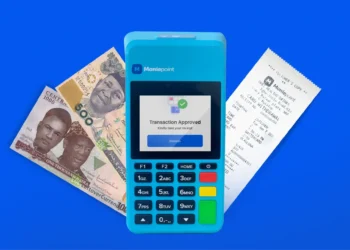OPay, a mobile banking operator, could account for N91,250,000,000 of the total revenue the federal government hopes to realise by imposing a one-time N50 electronic mobile transaction levy on N10,000 and above paid into an account daily.
Beginning on Monday, all mobile money banks in Nigeria will start charging a one-off N50 levy on every N10,000 and above. This in compliance with the Electronic Money Transfer Levy Regulations enacted in 2022.
Various fintech companies such as OPay and Palmpay sent out a notice to this effect to customers in the penultimate week. The levy is to be pooled together into an account to be administered by the Federal Inland Revenue Service (FIRS), the federal tax collection agency.
This is coming four months after the federal government conceded to pressure to reverse a controversial policy by the Central Bank of Nigeria, imposing a 0.5% cybersecurity levy on electronic money transfers. The difference, however, is that while the CBN’s policy affected transactions at the point of payment, the FIRS’s policy affects transactions at the point of delivery.
OPay’s notice to its customers on new transaction levy
OPay’s notice to its customers on new transaction levy
Aside from conventional banks, there are 17 licensed mobile money banks in Nigeria. But OPay and PalmPay, mobile money operators, have the largest market share.
OPay boasts of over 40 million active users while PalmPay has over 30 million customer base, comprising individuals and businesses.
VALUES OF THE LEVY YEARLY
Though it may be impossible to get the actual amount potentially realisable by the government, looking at the available numbers might provide some understanding.
Examining OPay’s customer base, it is assumed that five million users, representing 12.5% of OPay’s 35 million users, perform eligible transactions daily. If N50 is charged on these eligible transactions daily, that could mean N250 million for the government per day and N91,250,000,000 billion per year.
Further breaking the number down, if one million of OPay customers, representing 2.85%, perform levy-deductible transactions daily, the government could be getting N50 million daily and N18,250,000,000 annually through this regulation from OPay alone.
Mobile money operators enjoy robust fortunes in Nigeria as they have virtually become go-to payment platforms for many individuals and businesses, bridging financial exclusion. Transaction data for the year 2023 showed that the licensed 17 fintechs processed N46.6 trillion, according to the Nigeria Inter-Bank Settlement Systems (NIBSS).
E-payments reached an all-time high of N600 trillion last year. N10.73 trillion of this came through point of sale (PoS) transactions. Considering the substantial uptick in electronic transactions witnessed between 2022 and 2023, the figures for the current year could be higher by year end.
According to the regulations, banks are mandated to remit this levy to the FIRS by the next working day after the transaction or any other day dictated by the tax regulator.
This levy forms part of the revenues sharable among the federal, state and local governments monthly, which is crucial to a government whose overaching policy directive has been to generate more revenue.



















































































 EduTimes Africa, a product of Education Times Africa, is a magazine publication that aims to lend its support to close the yawning gap in Africa's educational development.
EduTimes Africa, a product of Education Times Africa, is a magazine publication that aims to lend its support to close the yawning gap in Africa's educational development.